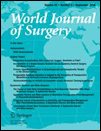Respiratory Complications After Colorectal Surgery: Avoidable or Fate?
The content of this manuscript was presented at the Annual Meeting of the Swiss Society of Surgery, on May 18, Basel, Switzerland.
Jonas Jurt and Martin Hübner have contributed equally to this work.
Registration: Registered under www.researchregistry.com (UIN 3413), approved by institutional review board (No. 2017-01991).
Abstract
Background
The prevention of post-operative pulmonary complications (PPC) is targeted by several enhanced recovery (ERAS) items including early mobilisation, prevention of fluid overload and omission of routine nasogastric tubes. The aim of the present study was to assess the impact of ERAS on PPC.
Methods
This was a retrospective analysis of an institutional database including consecutive colorectal ERAS procedures from May 2011 until May 2017. Multiple logistic regressions were performed to identify risk factors for PPC among demographic, surgical characteristics and items related to the ERAS protocol.
Results
In total, 1298 patients were included; among them 120 (9.2%) had one or more PPC. Multivariable analysis retained minimally invasive surgery [odds ratio (OR) 0.26; 95% confidence interval (CI) 0.15–0.46] and compliance to the ERAS protocol of ≥ 70% (OR 0.53; CI 0.30–0.94) as protective factors. Emergency surgery (OR 2.70; CI 1.20–6.01), blood loss of ≥ 200 mL (OR 2.06; CI 1.20–3.53) and ASA score of ≥ 3 (OR 2.00; CI 1.12–3.57) were independent risk factors. Median length of hospital stay was significantly longer in patients who experienced respiratory complications (21 [4–183] vs. 6 [1–95] days, p ≤ 0.001).
Conclusions
Minimally invasive surgery and high compliance with the ERAS protocol can help to prevent PPC.




